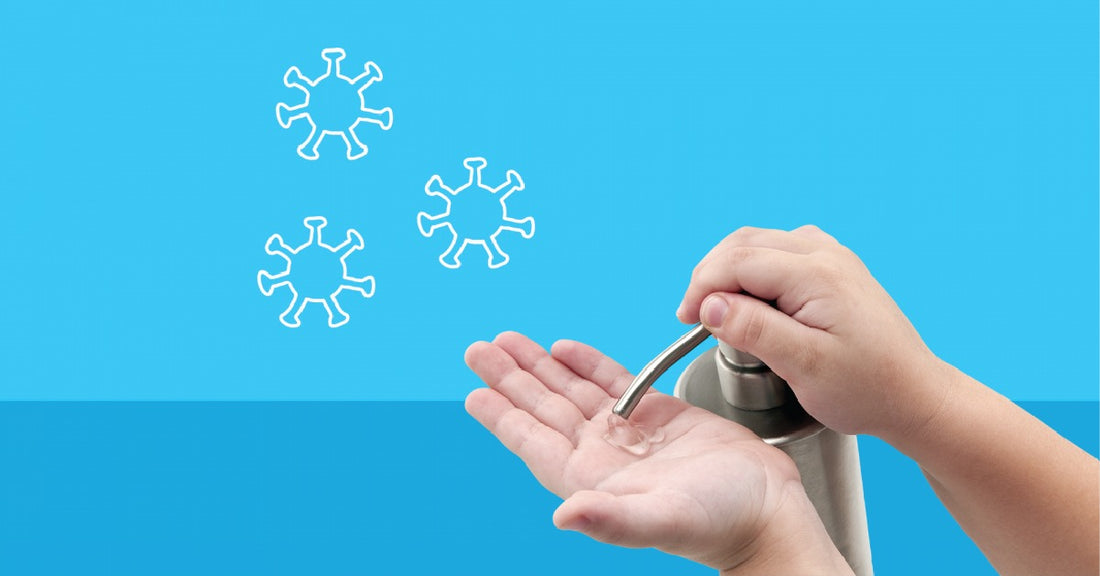You may not see them, but they are everywhere. They are on your skin, inside and all over your body. You will potentially experience billions of micro-organisms during the day from the moment you wake up in the morning until you fall back into bed at night.
It’s crucial to recognize that not all of the germs you’re exposed to on a regular basis are toxic until you crack the hazmat suit. Although exposure to germs is unavoidable during your day, there are some common pathogens that could make you sick. So, it’s a good idea to be mindful of these germs and try as best you can to stop them. There are many ways you can be cautious once your day starts and help decrease your risk of infection, diseases including:
Firstly keep your hands sanitized

Certain germs may live on surfaces for hours. On commonly used objects like doorknobs, courier packages, couch, equipment, toilet area, dustbin, kitchen sink, shower bases, taps, curtains, carpets, car seat respiratory viruses contained in droplets from coughs or sneezes can land. It can lead to infection by touching contaminated surfaces such as light switches, ATM devices, elevator buttons and other common surfaces and then rubbing your eyes or touching your nose or mouth. Via physical contact, including shaking hands, hugging, or kissing, viruses and bacteria may also spread.
One of the most important ways to protect yourself from respiratory and foodborne diseases as well as illnesses that cause vomiting and diarrhea is to wash your hands regularly and frequently with soap and water. An alcohol-based hand sanitizer is a great option if you don’t have access to soap and water. The Centers for Disease Control and Prevention recommends that you choose a hand sanitizer that contains at least 60% alcohol. Remove as much dirt or debris from your hands as possible before adding the liquid or gel. To guarantee its efficiency, read the product label for instructions and add as much as directed. Run the sanitizer over all the surfaces of your hands until they are ready for use. Before eating or touching your eyes, mouth or nose, after using the bathroom and when working in the kitchen, make sure your hands are clean. Do not believe that you can let your guard down only because you’re at home.
Maintain social distancing

Someone with the flu will transmit the virus up to six feet away to those who are standing there. Other viruses causing the common cold, measles, and pertussis (whooping cough) can also spread through the air through droplets from infected people’s coughs and sneezes. You may also become sick if you inhale these polluted droplets. Play it securely and keep some distance between you and anybody who seems or is sick.
Don’t share or borrow personal stuff

You might be more mindful of germs in toilets and public buildings, but when you’re around friends and colleagues, you become relatively lenient. Viruses and infections can spread by sharing or exchanging personal products, such as towels, razors, lipstick and water bottles. Do not use the utensils of someone else or drink from the bottle of another human.
Regularly disinfect common surfaces

Likewise, it is important to be careful about germs at home, cleaning the bathroom and kitchen countertops regularly. And give the shopping cart handle a rub with a disinfecting wipe when you’re at the grocery store, to reduce your exposure to harmful bacteria. It’s a good idea to disinfect your keyboard, desktop and other surfaces you touch on a regular basis if you work in an office and don’t you forget your phone. Keep your area of work filled with tissues, soap, hand sanitizer based on alcohol, and antiseptic wipes.
Keep clean with cuts and scrapes

It’s important to keep it clean and covered if you have an open wound, such as a scratch, scrape or burn, especially when you’re in a crowded or communal environment, such as a gym or pool. By touching contaminated surfaces or by skin-to-skin contact with an infected person, you may be exposed to bacteria, such as staph or MRSA.
Do not walk barefoot

Don’t forget to wear flip-flops or water shoes if you plan on using a public or semi-public shower, either at school, the gym or at work. Going barefoot may also raise the risk of human papillomavirus, or HPV, causing plantar warts. Via tiny cuts, scrapes or other wounds on the bottom of your feet, the virus will reach your body and infected you.
Be careful about buffets, food trays and street food

Some can actually neglect, despite several reminders for individuals to wash their hands more frequently. Make sure the foods that should be cold are chilled and the hot foods are steamed if you are dining out at a buffet or salad bar, which could help you prevent food-borne diseases. It is also prudent to stop consuming perishable foods that have not been refrigerated for more than two hours without sitting out at work or a party. Avoid eating at public stalls and street food as they don’t wear gloves which can lead to high chances of virus transmission. Switch to home-cooked food and stay healthy.
Clean and Change your toothbrush at regular intervals

Toothbrushes, especially if they are stored in a jar, can have bacteria and other germs. Toothbrushes that lean against others may be contaminated as well. Enable your toothbrush to air dry in an upright position, ideally several feet away from the toilet and sink, after brushing. Replacing toothbrushes every 3 months for your safety.
Vaccinate yourself and increase your immunity

The most effective way to prevent many dangerous diseases, like measles, flu, pertussis, hepatitis and varicella (chickenpox), is to be completely vaccinated against them, besides doing all you can to remain safe and keep your immune system high, such as getting quality sleep, following a healthy diet, taking immunity boosters and exercising regularly.
Stay Safe, Promote Hygiene!

